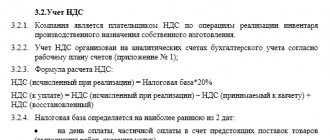Types of accounting policies of a motor transport enterprise
Each motor transport enterprise must have its own accounting policy. It is necessary to take into account that the trucking company:
- is obliged to maintain accounting - for this it is necessary to formulate an accounting policy for accounting purposes;
- has the right to choose a tax regime that is beneficial for itself, fixing the nuances of tax accounting in tax accounting policy.
The company has the right to combine these types of accounting policies in a single document (providing separate chapters for this) or draw up 2 documents - the law does not establish strict requirements in this matter.
Study the accounting features reflected in the accounting policies under various tax regimes using the materials posted on our website:
- “Rules for drawing up accounting policies for UTII”;
- “How to draw up an organization’s accounting policy (2021)?”.
You can create an accounting policy using an accounting program. Examples of UE for each tax system can be downloaded in the Typical situation from ConsultantPlus. If you do not have access to the K+ system, get a trial online access for free.
What is accounting policy
Accounting and tax legislation is not always strict and imperative.
In some cases, the legislator gives you the right to choose how to conduct accounting and tax records. An accounting policy (AP) is a document that establishes the rules and methods that an organization will apply when maintaining records. Companies formulate accounting policies independently. This is stated in paragraph 2 of Art. 8 of the Accounting Law. At the same time, for accounting purposes, only legal entities formulate policies, since individual entrepreneurs are exempt from accounting. For tax purposes, accounting policies are written by organizations and entrepreneurs.
The UE can be drawn up separately for tax purposes and separately for accounting. It is allowed to draw up a single document that reflects all the nuances. This is your choice.
We are forming an accounting policy for a transport company - what nuances should we take into account?
The accounting methods and methods established in the accounting policy (AP) of a transport company largely depend on the types of transport activities it carries out (transportation of goods, delivery of passengers, leasing of vehicles, repair and maintenance of automotive equipment, etc.).
If a trucking company simultaneously provides different types of services, the accounting policy must provide for separate accounting algorithms.
Learn about the nuances of accounting for motor transport activities from the article “Rules for accounting in a transport company (nuances).”
When developing a transport company’s management program, it is important to take into account the specifics of its work. In particular, reflect the following nuances:
- forms of specific primary information used (waybills, waybills, etc.);
- methodology for rationing fuel consumption (depending on the time of year, degree of wear of vehicles, etc.);
- the procedure for recording and writing off car tires;
- algorithms for accounting for other expenses characteristic of transport activities (motor insurance, recognition of expenses for medical examinations of drivers, etc.).
You can view a sample accounting policy of a motor transport company for accounting purposes on our website:
What types of accounting policies can a merchant create? You will learn about this from the materials on our website:
- “Accounting policies for management accounting purposes”;
- “Accounting policies in IFRS format - main provisions”.
Accounting policy of a transport organization in 2021: pay attention to the features
The article discusses only the features of the formation of accounting policies for 2021 by transport organizations maintaining accounting records in accordance with:
1) with the Law of the Republic of Belarus dated July 12, 2013 No. 57-Z “On Accounting and Reporting” (hereinafter referred to as the Law);
2) a standard chart of accounts for accounting and the Instructions on the procedure for applying the standard chart of accounts for accounting, approved by Resolution of the Ministry of Finance of the Republic of Belarus dated June 29, 2011 No. 50 (hereinafter referred to as Resolution No. 50, Instruction No. 50);
3) Instructions for accounting of income and expenses, approved by Resolution of the Ministry of Finance of the Republic of Belarus dated September 30, 2011 No. 102 (hereinafter referred to as Instruction No. 102);
4) Instructions for accounting of inventories, approved by Resolution of the Ministry of Finance of the Republic of Belarus dated November 12, 2010 No. 133 (hereinafter referred to as Instruction No. 133).
The possible text of the order on accounting policies is highlighted in bold in bold italics , and explanations (justifications) are in regular font, taking into account changes in legislation that must be taken into account when developing the accounting policy for 2021.
<�…>
1. Assessment of materials (fuels and lubricants, spare parts, etc.) upon receipt.
Materials are valued at accounting prices using accounts 15 “Procurement and acquisition of materials” and 16 “Variance in the cost of materials.”
Options:
— materials are valued at accounting prices using account 16 “Deviation in the cost of materials”;
— materials are valued at the actual cost of their acquisition (procurement) and are reflected in account 10 “Materials”.
Purchase prices are used as accounting prices for materials. Other costs included in the actual cost of materials are taken into account separately as part of transportation and procurement costs.
Options: the following is used as accounting prices for materials:
— actual cost of materials according to the previous reporting period. Deviations between the actual cost of materials of the reporting period and their accounting price are taken into account as part of transportation and procurement costs;
— planned prices. Deviations of purchase prices from planned prices are taken into account as part of transportation and procurement costs;
— average group price. The difference between the actual cost of materials and the average price of the group is taken into account as part of transportation and procurement costs. The average price of a group is established in cases where the item numbers of materials are enlarged by combining into one item number several sizes, grades, types of homogeneous materials that have slight fluctuations in prices;
— average price of each item of materials. The amount of deviation (the difference between the actual costs of purchasing the material and its price) is distributed in proportion to the cost of written-off (issued) materials at average prices.
Explanations (justification):
- pp. 39-41, 50 Instructions No. 133;
— Instruction No. 50.
<…>
Vitaly Rakovets, auditor of AuditIncom LLC
What to consider when drawing up accounting policies
The organization forms its accounting policy, guided by the legislation of the Russian Federation on accounting, federal and industry standards.
Accounting policy is understood as a set of accounting methods adopted by an entity - primary observation, cost measurement, current grouping and final generalization of the facts of economic activity (Part 1, Article 8 of the Federal Law of December 6, 2011 No. 402-FZ “On Accounting” (hereinafter referred to as - Law No. 402-FZ).
When forming an accounting policy in relation to a specific accounting object, a method of accounting is selected from those permitted by the Federal Accounting Standards.
In this case, you need to use the following documents sequentially:
- IFRS provisions;
- provisions of federal or industry accounting standards on similar or related matters;
- recommendations in the field of accounting.
If the FSB does not establish accounting methods for a specific issue of accounting, the organization itself develops an appropriate method based on the requirements established by the legislation of the Russian Federation on accounting, federal or industry standards.
At the same time, until the approval of the Federal Accounting Service, the accounting provisions (APS) approved by the Ministry of Finance of Russia in the period from October 1, 1998 are recognized as such.
Therefore, among others, the organization continues to be guided by PBU 1/2008 “Accounting Policy of the Organization” (approved by order of the Ministry of Finance of Russia dated October 6, 2008 No. 106n).
More on the topic:
What adjustments need to be made in accounting when switching to FSBU Inventories
Accounting policy of a transport organization, sample
The accounting policy of a transport organization is based on generally accepted principles and must take into account the nuances of the specifics of activities related to transportation.
Types of accounting policies of a motor transport enterprise
Each motor transport enterprise must have its own accounting policy. It is necessary to take into account that the trucking company:
- is obliged to maintain accounting - for this it is necessary to formulate an accounting policy for accounting purposes;
- has the right to choose a tax regime that is beneficial for itself, fixing the nuances of tax accounting in tax accounting policy.
The company has the right to combine these types of accounting policies in a single document (providing separate chapters for this) or draw up 2 documents - the law does not establish strict requirements in this matter.
Issue an invoice in foreign currency
We are forming an accounting policy for a transport company - what nuances should we take into account?
The accounting methods and methods established in the accounting policy (AP) of a transport company largely depend on the types of transport activities it carries out (transportation of goods, delivery of passengers, leasing of vehicles, repair and maintenance of automotive equipment, etc.).
If a trucking company simultaneously provides different types of services, the accounting policy must provide for separate accounting algorithms.
When developing a transport company’s management program, it is important to take into account the specifics of its work. In particular, reflect the following nuances:
- forms of specific primary information used (waybills, waybills, etc.);
- methodology for rationing fuel consumption (depending on the time of year, degree of wear of vehicles, etc.);
- the procedure for recording and writing off car tires;
- algorithms for accounting for other expenses characteristic of transport activities (motor insurance, recognition of expenses for medical examinations of drivers, etc.).
You can view a sample accounting policy of a motor transport company for accounting purposes on our website:
Article taken from the website Nalog-nalog.ru
Post Views: 61
Spread the love
- Accounting policy for individual entrepreneurs on OSNO, sample A detailed, reasonable and reasonable accounting policy for individual entrepreneurs on OSNO will not only allow…
- Accounting policy of a housing and communal services management company, sample Development of an accounting policy of a housing and communal services management company is based on the assumptions and requirements established by law, applied by commercial...
- Accounting policy of an autonomous institution The accounting policy of an autonomous institution includes a set of important organizational and methodological aspects: from the structure of the institution’s accounting service to...
Features of accounting for transport tax for profit taxation
When taxing profits, transport tax is included in other expenses (production, sales). The procedure for calculating costs depends on which method is used to account for expenses. It must be specified in the accounting policy.
The cash method involves accounting for transport tax
after being included in the budget. Firms (banks are excluded) can independently set the date for the expenditures subject to the following conditions: their average revenue for the previous year excluding VAT did not exceed 1 million rubles in each quarter.
If the accrual method is used, transport tax is charged to expenses at the time of accrual, namely, the last day of the reporting period. Article 318 of the Tax Code of the Russian Federation specifies the procedure for determining production and sales costs. Costs can be direct and indirect. The taxpayer independently establishes direct expenses and reflects them in the accounting policies. Others are classified as indirect, except for non-realization ones (Article 265 of the Tax Code of the Russian Federation).
In transport tax accounting, as well as tax accounting, expenses are recognized as expenses from the moment of payment. The tax is included in expenses (money actually paid).
With a simplified tax system and payment of a single tax on income, the tax base is calculated without transport tax. If a single tax is calculated by determining the difference between income and expenses, the amount of transport is recorded as expenses. It reduces the tax base.
If an organization pays UTII, transport tax is not included in the taxable amount. If the company is on two taxation systems (general and UTII), the car is taken into account in both with the distribution of the tax amount.
Who draws up the accounting policy
The accounting policy is developed by the chief accountant or the person entrusted with the responsibility for maintaining records. It could be the leader himself. The UE must comply with the following regulations:
- “On accounting” dated December 6, 2011 No. 402-FZ;
- Tax Code of the Russian Federation;
- Accounting regulations, of which the main one is PBU 1/2008.
The accounting policy is signed by the head of the organization, regardless of the presence of an accountant. The UE must be approved within 90 days from the date of registration of the company.







